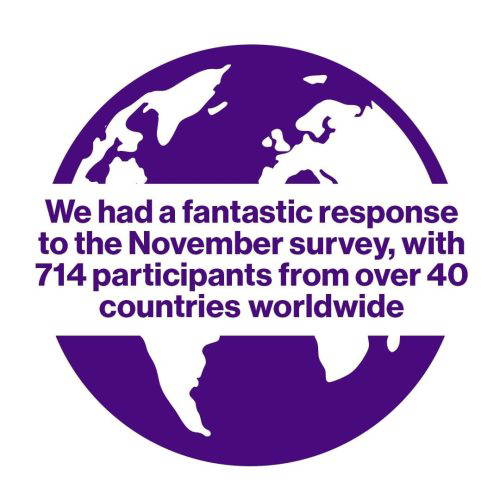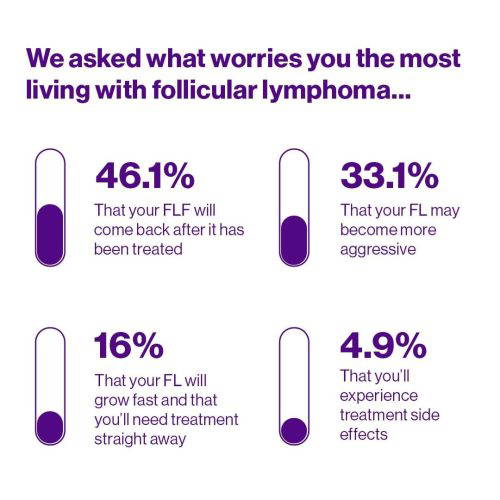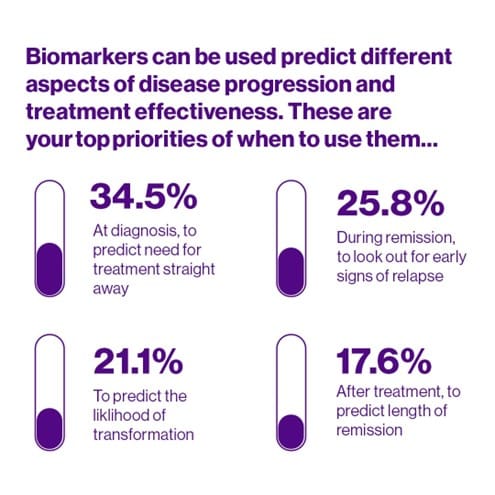Published: 21st February 2024
Biomarkers for follicular lymphoma (FL) are currently not well-researched or developed. The FLF is working towards improving the development of biomarkers to improve treatments specifically for FL patients.
What is a Biomarker?
A biomarker is a molecule, protein or gene which can be used to predict biological processes in the human body. Present in tissues, blood, urine, and other bodily fluids they can offer personalised insights into disease processes and treatment responses.
Click here to watch our Chief Medical Officer, Dr Mitchell Smith, explain more about what a biomarker is and why we think it’s an important area of research for follicular lymphoma.
What are we doing to build our understanding of biomarkers for FL patients?
We conducted a short survey to gather the opinions and experiences of people living with FL. We held a workshop at The American Society for Hematology (ASH) annual meeting, with some of the leading FL experts from around the world to discuss how we can address the lack of research in this area. We shared the survey results with these experts to ensure that the voices of those living with FL were heard. Following the workshop, we met with patient representatives to review the survey results and expert discussion.
Thank you to all patients who took part
The patient is at the heart of everything we do which is why we really appreciate your valuable insights. Your input is helping us shape the future of FL care and we want to ensure We were so grateful to receive a response from 714 participants from over 40 countries.

Insights from our biomarker development patient survey
Of the 714 responses, the main worries were FL returning after treatment and the possibility of it becoming more aggressive. Fewer people were worried about rapid growth and the need for immediate treatment, or the associated treatment side effects.

Other common concerns were the availability and affordability of treatment, running out of treatment options and managing mental health, including constant anxiety that every symptom is FL related and worrying about the future.
There was a more balanced response when we asked what was most important as an FL patient, for how and when a new biomarker could be used. People were most interested in the potential of biomarkers to be used at diagnosis, to show how likely they were to need treatment straight away or very soon. Following closely was incorporating biomarkers during remission, to detect early signs of relapse. A similar number of people were most interested in utilising biomarkers to predict the likelihood of transformation. Lastly, a smaller but still significant group thought post-treatment was most important, to predict the length of remission and being symptom free.

Reviewing the survey results with patient representatives
In the discussion with patient representatives, it became evident that priorities and perspectives on biomarker development varied depending on where individuals were in their treatment journey. It was felt from a patient’s perspective, having the biomarkers available in themselves would give patients a sense of empowerment, and could significantly alleviate their anxiety around whether and when their FL will return.
Thank you once again to everyone who took part in this important survey or sat on our patient panel. Your views are central to FLF’s work and we will use these results to help guide biomarker research and approaches to treatment and care.
Haven’t shared your thoughts yet? Stay tuned for more surveys in the coming months. Together, we’re making a difference!
If you would like to sign up to hear more about ways to get involved in our work and research opportunities as they happen, please complete our short ‘help shape our work form’ here.
Thank you to BeiGene, AstraZeneca and AbbVie for sponsorship of our independent biomarker discovery programme.
Disclaimer: This article serves to inform patients about the potential of immunotherapy in treating follicular lymphoma. Patients are advised to consult with their healthcare providers for personalised treatment recommendations and considerations.